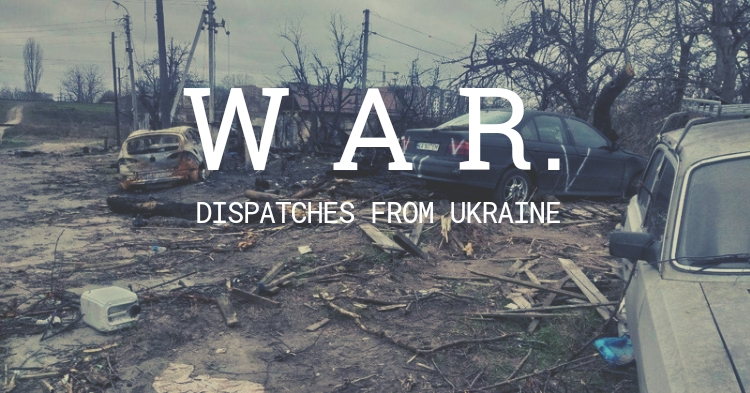My friend Nina is a journalist from Finland. She came to Ukraine just a few days after I came back from a village of Borodyanka, which had been completely destroyed by Russian occupiers.
Together with Nina we decided to go to the Kyiv suburb of Bucha, where Russian soldiers acted especially barbaric deliberately killing Ukrainian civilians. Nina had a female friend, whose parents happened to live in Bucha. She did not know anything about them – only that they managed to survive through the whole period of occupation. By that time, her mother was on a train to Western Ukraine.
Nina had her friend's father Mykolay number and I called him over the phone. The connection was very poor, we barely managed to talk. I asked Nick to send me his address in Bucha via SMS.
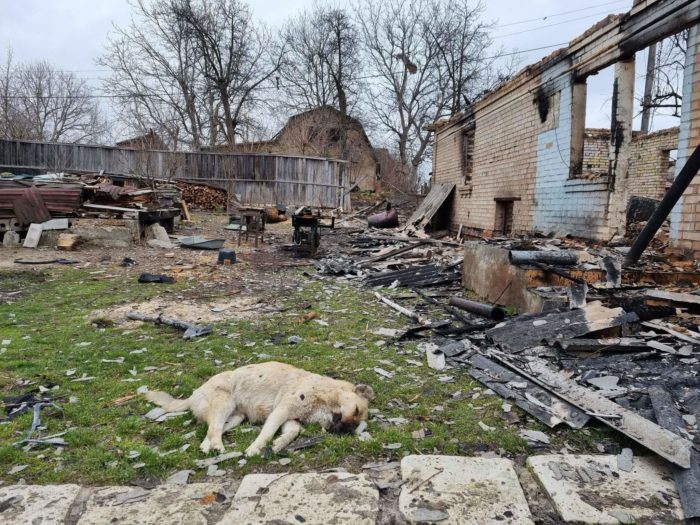
It was not easy to get to Bucha though it is a place very close to the city. The GPS navigator forced us to dodge through the narrow streets of Bucha. The town made a terrifying impression. As soon as we entered the city, it became clear that Bucha had experienced truly hard times.
The first thing we saw was a destroyed and looted supermarket. We saw crosses painted by chalk all around the streets. That was how Ukrainian military marked the places where they found the bodies of killed local residents. Unfortunately, there were a lot of such crosses on the way. The GPS navigator finally led us to Mykolay’s house. We stopped in the middle of a narrow street full of pine trees. It used to be a beautiful place perfect for a quiet relaxing holiday.
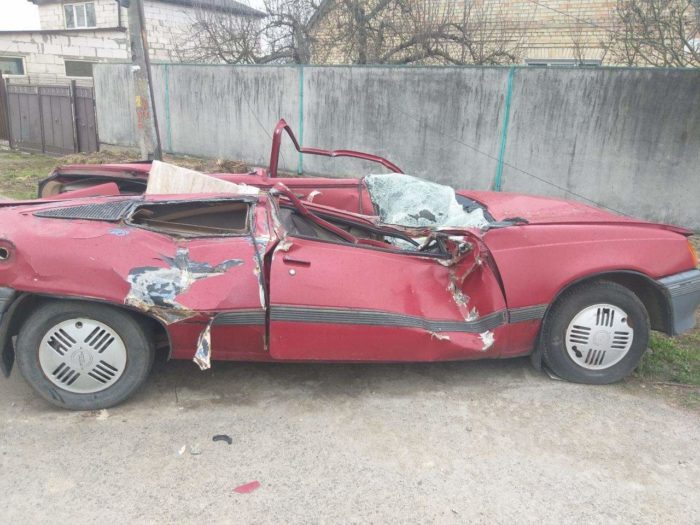
We got out of the car. Since there was no mobile connection, I decided to go to the iron gate and knock. As soon as I did so, I heard a muffled dog barking. She ran to the gate with her head down. Nobody seemed to come out. I knocked again. Nothing. The dog increasingly fell silent, trembling with fear. Obviously, she was scared.
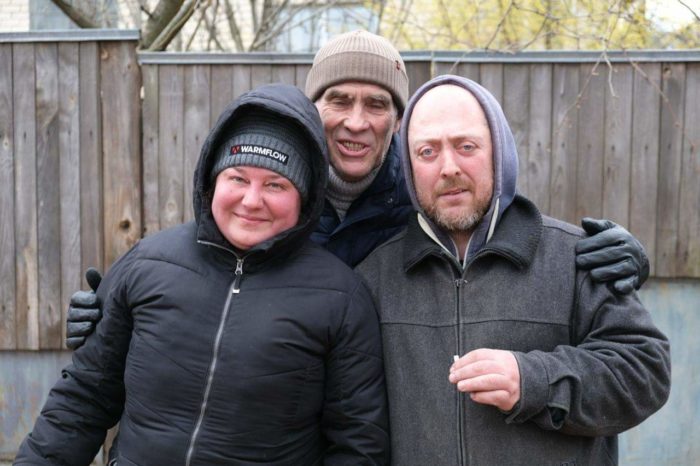
When I lost hope to reach anybody, I turned around and walked back to the car, and suddenly saw a man and a woman looking cautiously at me. The man leaned against the fence and the woman stood behind him. There was fear in their eyes. I introduced myself, explaining that we were searching for Mykolay. They started laughing and began hugging me. They smelled strongly of smoke and sweat. As it turned out, I made a mistake and knocked on the door of Mykolay’s neighbors, his house was right across the street.
The names of the neighbors were Yakov and Natalia. They touched me because I was nearly the first living being they saw in 40 days of the Russian occupation and afterwards. In a moment, Mykolay came in. He was very glad to see us, so we were immediately invited to his house for a cup of coffee.
Mykolay lives in Bucha all his life. He is a teacher of English. Yakov is a Georgian, he had his small business, and Natalia is a professor of economics. I gave each of them a pack of Marlboro. They were happy like kids. I cannot describe in words the joy and pleasure that Mykolay, Yakov, and Natalia radiated while drinking coffee. They savored every drop they drank, lifting the cup to their noses and enjoying the aroma.
In a relaxed atmosphere, Mykolay and his neighbors began to tell us the stories about how they survived in hell. They had no time to leave before the beginning of war. It was very scary because Russian troops were shelling Bucha with artillery. From day one of the occupation, residents of Bucha had no water, gas, neither electric power.
One day someone quietly knocked on Mykolay’s door, he thought it was one of his neighbors. However, it turned out to be Russian soldiers. According to Mykolay, there were 20 of them, all of them were young, about 19 years old, and they were wearing new uniform. They searched the house and ordered to surrender the smartphones (Mykolay threw the phones out before the Russian military arrived). A few hours later their street was densely shelled by rockets. Several houses were destroyed.
Mykolay and his neighbors suggested to walk to the next street where Russian military was stationed. On our way, we accidentally met a woman. She was waiting for the police. Yakov and Natalia knew her: her father died of natural cause during the occupation. The "orcs" - that is how Ukrainians call Russian soldiers – did not let her to bury him, so she stayed in the same room with a dead body for several days. Finally, orcs “took pity” on her and allowed to bury her father - right in the backyard.
The woman was waiting for the police to exhume him. We went on further. That was where I saw the real “Russian world,” not the one they talk about on Russian television – but how it looks in reality and what is does to the people. Wherever Russian soldiers stayed, there was a total mess: dirt, leftovers, scraps of uniform, army newspapers, etc.
However, it was not the worst thing I saw there. I saw several vehicles run over by a tank. Yakov said that the civilians who simply wanted to leave and were moving along the street posed no threat. But Russian tanks purposely ran over civilian cars. Whoever was inside the car died. Mykolay pointed out with his hand at a house - or rather a burnt skeleton of a house. We walked into the yard, and Mykolay told us that here Russians killed two brothers. Both of them were hiding in the basement of their own house. Russian soldiers shot them – and their dog as well.
Yakov showed me a nice house across the street. The owners of the house, the whole family - father, mother, two daughters, and grandparents - were killed by Russian soldiers as soon as they got into the house. Soldiers wrapped the bodies of its inhabitants in carpets and tried to burn them but nothing came out of that. For the whole month, their bodies were laying there until they were taken away by Ukrainian ryatuvalnyki
(relief workers.)
I didn't even dare to come close to the place. Natalia offered me to go to see the house of her sister. Russian soldiers also stayed there.
We entered the courtyard. The first thing I saw was a large bath ridiculously standing in the middle of the courtyard. Natalia told me that for some reason Russian soldiers tore out the bath from the bathroom on the second floor and threw it downstairs. They tried to cook some kind of food there. Apparently, something went wrong, and soldiers decided to use the bath as a toilet, although only ten meters away there were two regular toilets.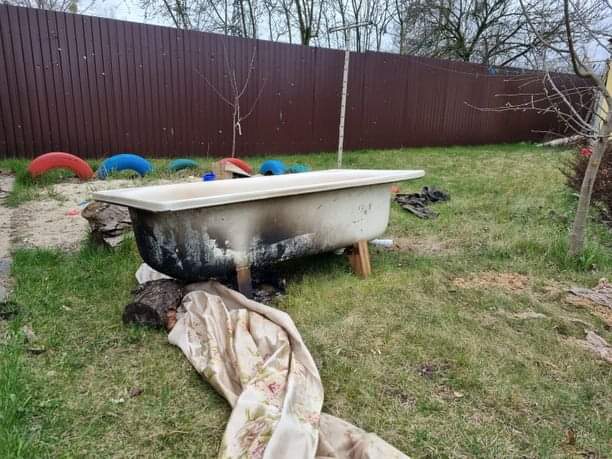
What I saw next confused me completely. Inside the house, there were a large bathroom, two toilets, and a shower. Nevertheless, for some reason, Russian soldiers decided to sleep there and arranged a toilet for themselves in a living room. When Natalia opened the door of the room, we saw the whole floor of the room littered with feces. I asked Natalia to close the door immediately, as I was getting sick.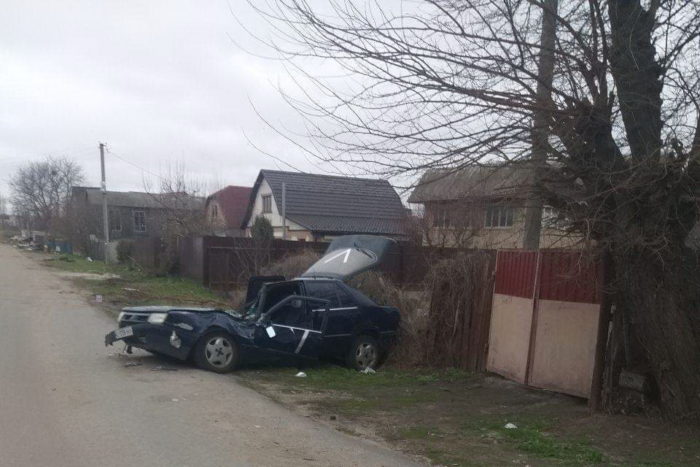
Mykolay and his neighbors didn’t want us to leave but we had to move on. On the way back, I thought, why do Russian soldiers behave worse than pigs? Honestly, it's just a figure of speech, and I apologize to the pigs. I have never seen such a mess in a pigsty.
Related:

